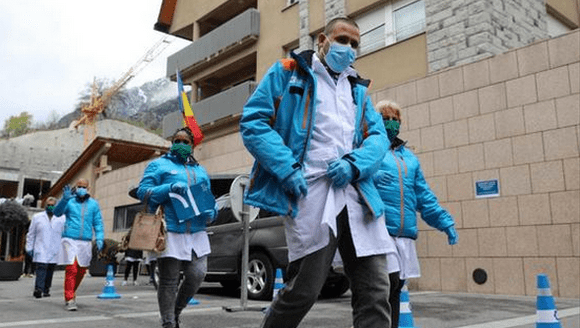
HAVANA TIMES – “If Cuba carries on like this, it will be the capital of unity.” This was the statement Pope Francis made in February 2016, after his historic meeting in Havana, with his Holiness Kirill, Patriach of Moscow and all of Russia.
And Pope Francis wasn’t wrong. Cuba is the capital of unity, solidarity and humanism, there’s no doubt about it.
It was unconceivable that Cuba would follow the suit of many other countries, including the US, and deny the British cruise ship MS Braemar entry to its port, which had five confirmed cases of COVID-19 onboard and some 40 potential cases. It was a simple operation if protocols established for these extraordinary situations were complied with: take them off the cruise ship, take them to the airport and put them on charter flights back to the UK. It was a success.
There were people who were against the cruise ship docking in a Cuban port. Some were genuinely concerned, others were being malicious, when they refused Cuba’s solidarity in this instance. I wonder: Could Cuba really cease to show solidarity to this group of humans, many of whom would die out at sea if they didn’t receive any help?
Cuba will never stop showing solidarity to those who ask for help. And this appeal for help came from the British government no less, certain that Cuba wouldn’t fail them, like so many others had.
As I write this piece, over 40 countries have asked Cuba to send medical aid to help fight COVID-19 and brigades have already left for 15 countries, mainly in Latin America and the Caribbean, although a brigade of Cuban doctors was also sent to the Lombardy region in Italy and another to Andorra.
The US government’s attitude is outrageous and sometimes hard to define, but it is pressuring other countries to refuse Cuba’s solidarity during this global pandemic and its own grim situation.
Recent weeks have been emotionally overwhelming, because in spite of the US government’s miserable attitude, there have been many messages of thanks from other countries where Cuba has sent doctors in an act of solidarity.
Ever since 1963, over 450,000 doctors have helped other countries and saved over 7 million lives across the globe. Thousands of doctors, nurses and other health professionals are always ready to go anywhere they are requested. When there was the Ebola virus epidemic in Africa, over 12,000 people were willing to fight the disease, even when they knew the risks this entailed, which emphasises the Cuban people’s and medical professionals’ spirit of solidarity and altruism.
Many of these messages of gratitude have come from Lombardy, in Italy, where a brigade of Cuban doctors are working. One said the following: “It is with a lot of pride and admiration that we have a brigade of Cuban doctors and nurses here to help our country; now, every newspaper will speak well about Cuba, let’s hope that given the current situation, the world can be a little more proper and sincere with a country that has always shown a lot of solidarity with other countries.”
Another message points out that “in spite of the serious difficulties caused by the US’ criminal blockade on the island over many years, Cuba has helped countries with a great deal of generosity and represents what a socialist society is today more than ever before.”
Of course there is no denying that Cuban aid workers are working in adverse circumstances right now, at risk of becoming infected themselves, but determined to help the countries they have gone to, which are already 15 as part of the Henry Reeve contingent, as well as professionals already in other countries, who have joined the fight against COVID-19.
In a few weeks or months, the COVID-19 pandemic will just be a sad memory, because of the thousands of lives it is taking, but many countries will remember Cuba as the capital of solidarity.
Elio Delgado-Legon: I am a Cuban who has lived for 80 years, therefore I know full well how life was before the revolution, having experienced it directly and indirectly. As a result, it hurts me to read so many aspersions cast upon a government that fights tooth and nail to provide us a better life. If it hasn’t fully been able to do so, this is because of the many obstacles that have been put in its way.


